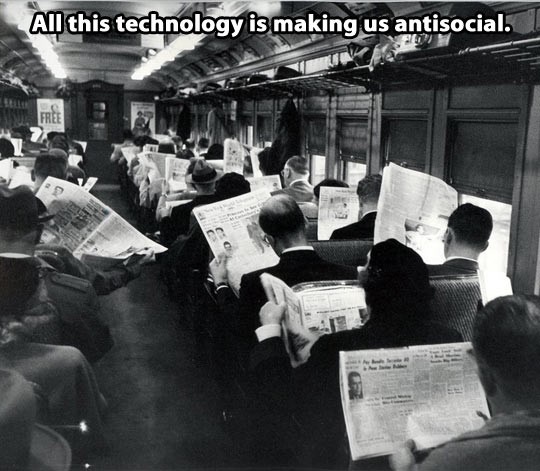“Millennials are always on their phones. Millennials are always on social media. Millennials are ruining the world. This generation doesn’t have any social skills.” I’ve heard it all before and I’m not even a millennial. For future clarification, I am part of Gen Z.
Now, this may come as a shock to some people, but stay with me here … the world has changed over the past 100 years. I know, I know, I didn’t believe it at first either, but it’s true! Phones now fit in our pockets, traditional print publications have taken up residence on this thing now referred to as ‘the internet,’ and the worst part of it is that you can’t even buy a dang soda pop for 50 cents anymore. What more utter proof do you need in order to see that the world is going downhill at an incredibly rapid rate? Well, at least we have memes now.
To tell you the truth, though, things aren’t that different now than they were back in the day. Members of older generations seem to have this preconceived notion that technology and a lack of social skills have taken the place of human interaction. I don’t know what world my parents grew up in, but I find it hard to believe that any New Yorker would casually walk around the street with a smile on their face casually striking up conversation with me [a stranger] in any decade.

This iconic picture circulates the internet depicting a max capacity train, where you can see rows upon rows of people minding their own business reading the paper in solitude. If you colorized the photo, updated the wardrobe, and swapped out about three-quarters of the newspapers for smartphones, it wouldn’t look much different from a ride on the LIRR today. Ironically, I retrieved this photo from this article, which has more informed comments than the article itself (another ironic benefit of digital media).
Is our technology a tad problematic? Perhaps. We carry our phones around like security blankets, there is the ever-growing problem of attaining news from reputable and reliable sources, and we have tendencies to take social media to extremes. But if tech wasn’t distracting us, it would be the the newspaper, smoking cigarettes or the latest gaming sensation: desktop solitaire. There’s nothing inherently wrong with technology, and there’s nothing about it that degrades a generation. In fact, I’d argue that older generations are just as guilty of falling to the perils of technology as younger generations.
Technology has developed … it’s just a fact of life. As humans progress through the evolutional cycle, technology does the same. Older people are just set in their ways — younger people welcome changes in their everyday lives whereas older generations are more obstinate to change.
It’s interesting to see that, even though digital is clearly the future of media, brands continue to value earned media in print more when compared to online articles. It’s understandable that print is traditional and has a glamorous air of superiority, but the only thing keeping print around these days is the tradition itself. Ultimately print editions will come and go, but the internet is forever. Your brand that made the print issue of Vogue last month was a great placement, but now it’s last month’s news. My brand that got mentioned in a few online Vogue articles this month will be on the internet forever — they will never be last month’s articles; they will come up on Vogue’s website, social media and whenever someone puts in a relevant search … and, as opposed to print, it’s free for the consumer.
We’ve gotten to a point where it’s just easier, cheaper and quicker to consume media and entertainment digitally. This is no different from having your eyes glued to a television as you flip between watching the news and reality TV. Sara Haines, a co-host on the popular morning show “Strahan, Sara and Keke,” was stunned as Keke Palmer described how children watch livestreams of other people playing video games. “So they just sit there and watch other people live their lives…” says Haines, and as she trails off she even admits to realizing what she was saying as she was saying it. People have been doing that for years and without them, she would be out of a job.
The entertainment industry almost exclusively generates its revenue by having an audience that is intrigued by the lives of others, whether it be movies, reading tabloid gossip, etc. This form of consumption is no different than watching a sporting event, the only difference being it’s a virtual game and not a game played in real-life.
It’s high time that we accept the fate of the media and entertainment industries. We need to take a hard look at reality and assess the things that have changed and the things that have not changed. In order to make the most of your consumption, we must be more mindful about what we are consuming as well as what we are producing.
